Authors — Nicholas Rombes
-
The Blue Velvet Project, #72
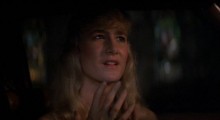
Second #3384, 56:24 1. Sandy’s dream, recounted to Jeffrey: In the dream, there was our world, and the world was dark because there weren’t any robins. And the robins represented love. And for the longest time there was just this darkness, and all of a sudden thousands of robins were set free and they flew down and brought this blinding light of love. And it seemed like that love would be the only thing that would make any difference. And it did. 2. A few moments earlier, Jeffrey said to Sandy: Frank is a . . . a very dangerous […]
by Nicholas Rombes on Jan 27, 2012 -
The Blue Velvet Project, #71
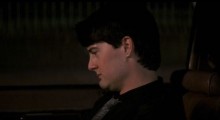
Second #3337, 55:37 1. Jeffrey, struggling. Working through over and over again the evil equation that is Frank. 2. The sound of sound has come apart. Everything that matters is between his ears. 3. His ear; the fact of his non-severed ear. 4. The haircut to reveal the ear. 5. An actor, preparing to say his next line, or has he forgotten the presence of the camera? 6. The fullness of night, and its comfort. 7. To be drowned in the blackness of introspection. 8. A terrible thought: is Frank supernatural, beyond human agency, beyond human Law? 9. “Look out […]
by Nicholas Rombes on Jan 25, 2012 -
The Blue Velvet Project, #70
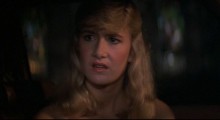
Second #3290, 54:50 Sandy’s reaction, as she listens to Jeffrey’s theory about the significance of the severed ear. “I think she [Dorothy] wants to die,” he says. “I think Frank cut the ear I found off her husband as a warning to stay alive.” That’s a key sentence, almost lost in the film’s narrative momentum. The severed ear isn’t intended simply to secure a ransom, as might be expected, but rather as a message to Dorothy not to die. As the object of Frank’s furious desire, Dorothy is just another one of his addictions, his fascinations. Sandy’s face, softly lit […]
by Nicholas Rombes on Jan 23, 2012 -
The Blue Velvet Project, #69
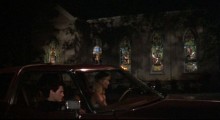
Second #3243, 54:03 “It’s a strange world, Sandy.” *** “Frank is a . . . a very dangerous man.” *** “You saw a lot in one night.” *** “It is a strange world.” These lines from around the moment of this frame collapse into one meaning, one meaning obvious to Sandy: that Jeffrey has fallen in love with Dorothy. Outside the church, Sandy is about to deliver her “robins” monologue, a monologue that securely nails Blue Velvet to the wall of sincerity. The shot itself is full of menace and beauty: the night, the soft illumination of the car’s interior, […]
by Nicholas Rombes on Jan 20, 2012 -
The Blue Velvet Project, #68
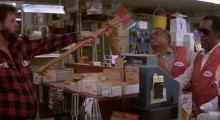
Second #3196, 53:16 At the hardware store (in a scene that doesn’t appear in an earlier draft of the script) a moment of frontier humor staged so fundamentally close to truth as to approach the surreal. A customer (as if a future character from Twin Peaks who has slipped back in time four years) holds an axe up to Double Ed, who reads the number to the blind Double Ed: “New axe, 48721.” It’s a welcome bit of humor in light of the previous scenes in Dorothy’s apartment, right down to the awkward stance of the axe man (pipe in […]
by Nicholas Rombes on Jan 18, 2012 -
The Blue Velvet Project, #67
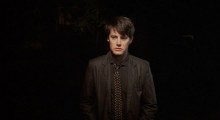
Second #3149, 52:29 1. After leaving Dorothy’s apartment, Jeffrey walks home in the dark, in one of Blue Velvet’s furiously abstracted montage sequences, where sound and image come together to convey a doomsday atmosphere so totalizing and intent on destruction (the destruction of innocence) that to try to convey it in anything less than one long sentence would be a betrayal, not only of the fact of black in this frame, but of the blackness of Jeffrey’s heart and his realization of this blackness in his face, in that askance look, as if he was the one ravaged instead of […]
by Nicholas Rombes on Jan 16, 2012 -
The Blue Velvet Project, #66
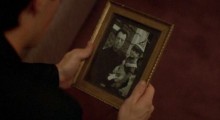
Second #3102, 51:42 The frame within the frame. Jeffrey, on his way out of Dorothy’s apartment, stops and retrieves from beneath the couch the framed black and white photo of Don and Donny that Dorothy had gazed at immediately after Frank’s call. A fury of angles and lines, rectangles within rectangles. The frozen image captures a moment in time, while what transpires on the screen (no matter how many years have passed since Blue Velvet was filmed) happens right now. Seymour Chatman, in Story and Discourse, writes about still time and moving time on the screen: The effect of pure […]
by Nicholas Rombes on Jan 13, 2012 -
The Blue Velvet Project, #65

Second #3055, 50:55 “I’m leaving now,” says Jeffrey. Dorothy, her back to the camera, stands in the bathroom, facing the mirror, her red shoes on the tiled floor beside her. Another radiator, like an iron spy from another world. The screen, divided against itself. Crowded by darkness, Dorothy’s space is a like a music track awaiting the vocals. The open toilet some sort of joke. A zombie film: Dorothy dead and not knowing she is dead, hungry for Jeffrey’s flesh, or the way hallways always lead to bad ends. In a room across the city, her son held hostage. The […]
by Nicholas Rombes on Jan 11, 2012 -
The Blue Velvet Project, #64
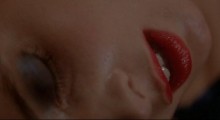
Second #3008, 50:08 Dorothy’s face fills the screen, leaving no room for thought. At this moment, there is no possibility of anything outside the frame. This may seem an odd moment, an odd frame, to re-introduce the power of ideology, for there seems to be nothing overtly “political” about this frame. And yet, Dorothy’s suffering here—rendered in a fashion-photography aesthetic—is utterly reactionary and in tune with a certain mid-1980s, Ronald Reagan wave of nostalgia. In their toxic, neural pathway altering chapter from Dialectic of Enlightenment (1944) entitled “The Culture Industry: Enlightenment as Mass Deception” (an essay which remains the ultimate […]
by Nicholas Rombes on Jan 9, 2012 -
The Blue Velvet Project, #63
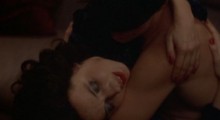
Second #2961, 49:21 “Do you like me?” Dorothy asks. “Yes,” says Jeffrey. “Do you like the way I feel?” These are simple, almost childlike questions and answers, tender, quiet exchanges of whispered words as if to replace the previous horrors with a new hope. In John Banville’s 1997 novel The Untouchable, Victor Maskell narrates the story of his transformation into and life as a double agent for the Soviet Union during the 1930s, 40s, and 50s in England: We were latter-day Gnostics, keepers of a secret knowledge, for whom the world of appearances was only a gross manifestation of an […]
by Nicholas Rombes on Jan 6, 2012
